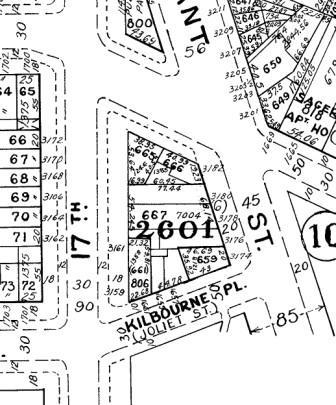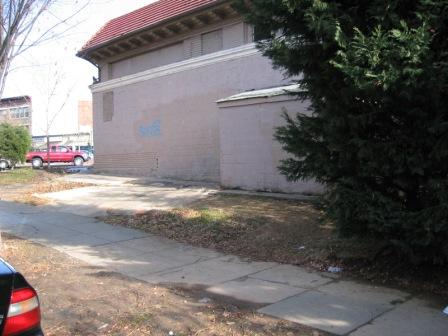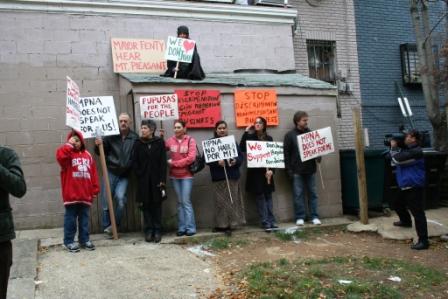The Mount Pleasant situation is complicated by the absence of service alleys to handle trash, and for access by trash trucks. This problem has been especially troublesome in the block of 17th Street behind the Bestway Supermarket and Don Juan's Restaurant, block "2601" in the adjacent surveyor's chart of the area. Because Mount Pleasant Street, running at an angle, here converges with 17th Street, the block is especially narrow, wide enough for just one building. The front of the building faces, naturally, on Mount Pleasant Street. The back of the building faces 17th Street, and the residents across 17th have a direct view of, unfortunately, the back of the building.
But wait, there are more complications to this location. Like many Mount Pleasant streets, 17th is a 90-foot-wide right of way. As the surveyor's chart shows, 30 feet is used for the roadbed, and 12 feet on either side for sidewalk, leaving 18 feet on either side unused. This is the "parking" discussed in some detail elsewhere on this site. It is "public space", but that doesn't mean "free for public use", as the homeowners on the west side of 17th Street will attest.
The building on this small commercial block is built right up to the property line (like most houses here), so the back wall of the building is the edge of "public space". That 18-foot strip of public space is, quite naturally, where the occupants of the commercial building put their trash containers. If this were private property, there would be only complaints about the appearance of the area, and there would be little that the residents across the street could do about it. Ah, but it's "public space", and that makes the business owners vulnerable to legal attacks.

This north end of the building houses Don Juan's Restaurant, a venture operated by Salvadorean immigrant Albert Ferrufino. Just on the inside of that wall is his kitchen. Beyond that, his carry-out counter, then a bar, and the sit-down restaurant. There is no provision for trash storage, which is presumably why this little block structure was built, longer ago than anyone can recall. Alberto is, of course, legally vulnerable: not only does this little structure have no permits, but it's built on "public space". So the neighbors -- one neighbor, really -- across the street have an easy target for their complaints.
Alberto has done his best to placate this difficult neighbor. He used to have a small dumpster on this space, which of course was unsightly, and the neighbor complained about it. So he disposed of the dumpster, and put his trash instead in containers up close to the wall, not so visible from across the street. Still, the neighbor complained, and not just in person, but filing formal complaints with the District, charging Alberto with putting trash "on public space". Alberto tried to mollify the neighbor by building a little stockade fence around his trash containers, whereupon the neighbor filed complaints of "an illegal fence".

Remarkably, residents appeared to defend Alberto Ferrufino and his restaurant. In short order, the "illegal" structure was surrounded by placard-waving demonstrators. One courageous demonstrator, who happens to live directly across the street from this supposed problem location, parked herself on the roof of it, and dared the work crew to try to tear the shed down.
After a couple of hours of standoff on a cold November morning, the order came down from the Mayor: do nothing, "no action will take place on this matter," until people and their representatives can come together to define a reasonable solution to the problem.
That meeting was held some time later. The acting Attorney General for the city asked a simple question: what, really, was wrong with this little masonry shed? Why was it a problem? He wasn't interested in assertions that trash on public space was inherently illegal, and he was sympathetic to the restaurant's problem of needing someplace to house its trash. While the final decision is not yet in, it appears that the District will issue permits to allow this shed to remain in place.*

This dispute is not just about a conflict between a business and nearby residents, uncomfortable neighbors. Underlying this conflict is the division between the upper-middle-class "Anglo" homeowners and the Latino business. The patrons of this restaurant are largely working-class Salvadorean and other Latino immigrants. They're not always the best-behaved of people, and nearby residents have some legitimate complaints. On the other hand, this place has been a restaurant for decades, whereas the nearby neighbors who complain so vociferously knew when they bought their homes that this was a commercial establishment, with sometimes noisy patrons.
If this were, say, a Starbuck's coffee shop, no one would complain about it, and there would be none of these complaints about "illegal structures" and "trash on public space". The fundamental problem is that the restaurateur and its patrons are working-class Latinos, and the nearby neighbors are not.
Recently a feature story in the Washington Post described this clash of cultures in Mount Pleasant: ."Mount Pleasant's Growing Pain" . It's not a perfect picture of the situation, but gives the essence of the dispute. Mount Pleasant is proud of being "multicultural", but not all residents are truly tolerant of cultural differences.
To be clear about it: I have defended Alberto Ferrufino, and worked to win these battles with his neighbor, for several years. He's an immigrant entrepreneur trying hard to make a living. His clientele may be a bit rough around the edges, but they're residents too.